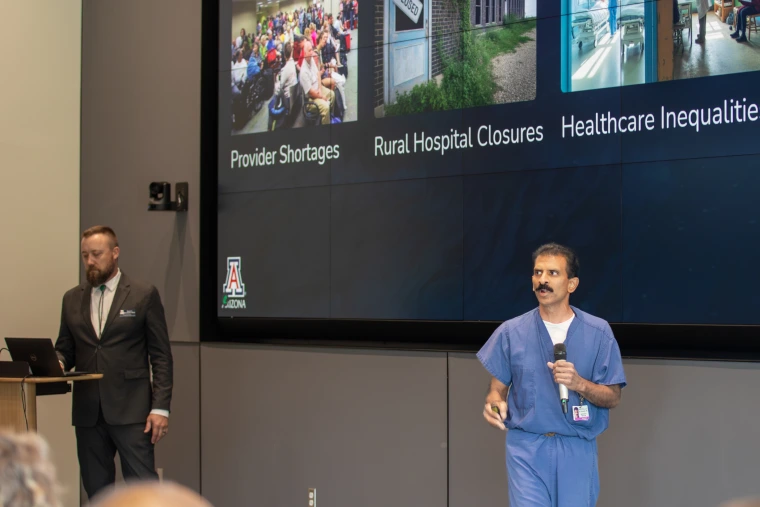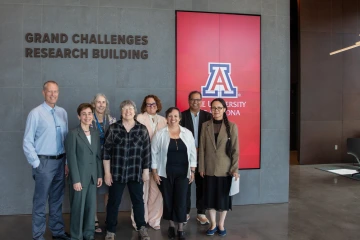Drs. Srikar and Drummond represent the Department of Emergency Medicine on the new University of Arizona Big Idea Challenge

Srikar Adhikari, MD, MS, presents his team’s project, which will pair advanced tech with multilingual support, virtual education and community collaboration.
Leslie Hawthorne Klingler
This past summer, the Department of Emergency Medicine’s Srikar Adhikari, MD, MS, and Brian Drummond, MD, principal and collaborative investigator respectively, were the only researchers from the College of Medicine – Tucson on study teams that received one of the University of Arizona’s inaugural Big Idea Challenge grants. Six grants were awarded out of 72 university-wide proposals.
The program is designed to “incentivize transdisciplinary, convergent research teams to incubate ideas, generate new insights, and launch transformative, high-impact projects with the potential for future extramural support,” focusing on six strategic research pillars (Defense and National Security; Energy and Environmental Sustainability; Health and Biomedical Sciences; The Human Experience; Data, Information Systems and AI; and Space Sciences). Its main objective is to be a springboard to secure large-scale external funding for high-impact research.
Each successful research team receives two years of support that includes $250,000 in seed funding, support for developing a long-term vision for the research and finding potential large-scale funding opportunities (via assistance from the U of A’s Washington, D.C., consultants, Research Development Services and Foundation Relations), marketing and communications support, teaming support (on and off campus), technology and start-up support (from Tech Launch Arizona and Tech Parks Arizona), and support from U of A mentors who have already leveraged their big ideas into an externally funded effort. The winning projects started on July 1.
The goal of Dr. Adhikari’s Convergent Digital Health for Remote Access (CoDiRA) project is to expand access to health care through digital tools. Its main objective is to build scalable, culturally sensitive models to bridge health care gaps in Arizona and beyond. CoDiRA reimagines health care delivery with AI-powered kiosks, remote diagnostics, medical selfies and personalized digital twins. Designed for underserved populations, it pairs advanced tech with multilingual support, virtual education and community collaboration.
“Being selected as one of the Big Idea Challenge winners is both an honor and a powerful affirmation of the bold vision behind CoDiRA,” Dr. Adhikari said. “This recognition highlights the strength of our transdisciplinary team, the deep collaborative spirit across colleges and the unwavering support of the University of Arizona. Winning this award allows us to take a major step forward in improving health care access for underserved populations, moving from concept to the implementation of digital health solutions with real-world impact.”
Led by Dr. Adhikari, this transdisciplinary project includes colleagues from the College of Medicine – Tucson Information Technology Services, the College of Information Science, the College of Nursing, the College of Applied Science and Technology, the Institute for Computation and Data-Enabled Insight, the Data Science Institute, the Center for Biomedical Informatics and Biostatistics, Tech Launch Arizona, the College of Engineering Department of Biomedical Engineering, the Mel and Enid Zuckerman College of Public Health Department of Epidemiology and Biostatistics and Department of Health Promotion Sciences, and the Department of Psychology Health Equity Analytics Lab.
Dr. Adhikari also briefly described the objectives of his research on the local news (note that the reporter mistakenly says that the grant award is $5,000 rather than $250,000).

Dr. Drummond with the Heat and Health Resilience Innovation Consortium research team.
Leslie Hawthorne Klingler
Aiming to address the extreme heat causing record-breaking deaths in Arizona, the Heat and Health Resilience Innovation Consortium, on which Dr. Drummond is a collaborative investigator, entails launching a statewide consortium to develop wearable biosensors, kiosk care, multilingual apps and AI-driven health risk tools. It integrates tech, clinical training, and community partnerships to save lives and lead innovation in climate-responsive health. This project is co-led by two College of Medicine – Phoenix faculty members, Amelia Gallitano, MD, PhD, professor of basic medical sciences and psychiatry, and Freya Spielberg, MD, MPH, vice chair of research and clinical professor of family, community and preventive medicine, and involves other departments and community stakeholders.

